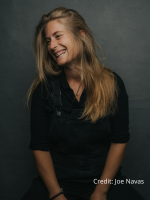This summer, farmer Dave Dewitt of Truro told me he’s growing something I’ve always thought of as a southern crop — okra.
"It does need heat, but since we’ve gone from Zone 5 when I started farming 30, 40 years ago to Zone 7b, it’s no problem."
Zones are shorthand for the way the USDA categorizes and maps where plants will survive based on average temperatures. In Zone 5, for instance, the average coldest winter temperatures are between negative 20 and negative 10 degrees Fahrenheit, and that was the case here on the Cape in the 1990s. But now our winter temperatures have warmed so much that our lowest averages are between 5 and 10 degrees Fahrenheit, putting us firmly in Zone 7b. Sarah Matto of Wellfleet who works as a landscaper, says this is changing all kinds of things.
"One of the biggest changes that I’ve seen and I’d say around like even five years ago is we would plant garlic seed, always in the fall, around Columbus Day. It’s Columbus Day, it’s time to plant garlic. And now, that’s shifted to Thanksgiving."
Cold temperatures are arriving almost five or six weeks later in the fall and Sarah says she’s also noticing that the whole timing of winter and spring are shifting.
" We used to start opening up the gardens in the beginning of March, but we’ve found that March can pretty much be like December used to be where it’s still very wintery," explained Sarah, "and we’ve shifted our start time til really around April 1, and we can go into December."
This means the growing season even as it shifts is a little bit longer, and this change too opens up new crop possibilities. Dave Dewitt says this coming year he’s going to try growing peanuts.
I asked Dave how he got this idea.
"It’s just our temperature, we can do it now. With our climate changing we’re able to pull it off."
Peanuts need at least a 110-day growing season, which back when we were Zone 5, would have been a stretch. Average last frosts were often as late as April 30th, and first frosts in early to mid-October. But Dave already knows farmers in the northeast succeeding in the last few years with peanuts.
"I had a friend in New York state that did a huge crop last year and dry roasted them and they were delicious, we were cracking peanut shells that were grown in New York state."
Another Wellfleet gardener, Kris Smith, says he has crops overwintering now that wouldn’t have made it through cold snaps a decade ago:
"I mean we've had pretty good luck with kale and mustard, some poc choi, I think, one of the chois, and any of the herbs and stuff seem to last all winter long," said Kris.
Other shifts in the local climate have to do with water. For instance, we’re getting heavier rains when they come but less frequent which means more potential for drought, so Kris is adapting the way he creates garden beds.
"I mean it’s basically sand, so we did bury a bunch of wood and leaves this Hugelculture style where with the heat and drought conditions this year for a bunch of it um you know to have some of this organic matter buried in there helps to retain some of that moisture and stuff."
Seeing how fast our local climate is changing can be overwhelming and scary — and it’s real and not something to minimize — but it’s also a fascinating time to be outside adapting and experimenting. And I’m reckoning with the fact that both things can be true.








